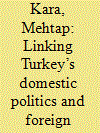|
|
|
Sort Order |
|
|
|
Items / Page
|
|
|
|
|
|
|
| Srl | Item |
| 1 |
ID:
113422


|
|
|
|
|
| Publication |
2012.
|
| Summary/Abstract |
New Zealand homes are poorly insulated by international standards. There are government subsidies available for people to improve the energy efficiency of their homes but uptake has been relatively low among owners of rental properties. This paper presents the results of a choice experiment used to investigate the preferences of home owners and tenants for insulation and heating upgrades. The responses indicate that landlords may underestimate how cold their rental properties are in winter, considering the level of discomfort reported by tenants. Median willingness-to-pay (WTP) for improved insulation by landlords is only 50-70% of owner-occupier values. Landlords are willing to pay more for a heating appliance than any other retrofit option. In contrast, tenants have a low WTP for the heating appliance and would prefer under-floor insulation. Tenants express a willingness to pay higher rent in exchange for improved energy efficiency, at a rate that would appear to make such upgrades economic for the landlord. Information asymmetry and lack of appropriate market signals may be a large part of the reason why many landlords are not willing to pay market prices for energy efficiency upgrades.
|
|
|
|
|
|
|
|
|
|
|
|
|
|
|
|
| 2 |
ID:
187046


|
|
|
|
|
| Summary/Abstract |
This article examines Turkish domestic politics and the country’s foreign policy behaviors under the ruling Justice and Development Party (AKP), using Joe Hagan’s three alternative political strategies: accommodation, insulation, and mobilization. The first AKP administration used an accommodation strategy to avoid confrontations with military and judiciary institutions, resulting in restrained foreign policymaking. During its second tenure, the AKP leadership successfully insulated domestic opposition, allowing for implementation of a new foreign policy agenda. In the post-failed coup period, to discredit domestic adversaries, unify the public, legitimize leadership positions, and demonstrate a capacity for maintaining the nation’s security, the AKP has adopted a mobilization strategy and manipulated Turkish foreign policy through a ‘diversionary war’ in Syria and periodically escalated tensions in the Eastern Mediterranean region. This strategy has helped contain domestic opposition, while diverting public attention from divisive domestic problems to Turkish military activities abroad.
|
|
|
|
|
|
|
|
|
|
|
|
|
|
|
|
| 3 |
ID:
141885


|
|
|
|
|
| Summary/Abstract |
Thermocouples have been extensively used for the measurement of temperature since the advent of seebeck effect. Numerous sensors have been developed for temperature measurement, yet measurement of high temperature flowing fluid has been a challenging task. For the measurement of static temperature the measuring device should travel with the fluid at the same speed without disturbing the flow, which is quite unrealistic. So indirect determination of static temperature of flowing fluid is done by using thermocouple exposed into the flowing fluid. Other sensors available for high temperature measurement may lead to problems like resistance in the flow path of fluid which changes the structural dynamics. Thin film thermocouple (TFTC) based on W-W26Re for super high temperature measurement has been investigated which can be used in missiles for surface temperature measurement of nozzle and rocket interior surface. TFTC does not cause disruption in the flow path with maintaining structural integrity. The W-W26Re thermocouple offers advantage of higher seebeck coefficient at high temperature i.e. above 750 K, and usability in vacuum, inert and hydrogen atmosphere. Zirconia Fiber has been proposed as insulation protection material over thermocouple. Modelling and simulation of the TFTC for the temperature range 300 K - 2900 K has been presented. FEA model using PDE has been presented to implement heat equation, current balance quation, Gauss theorem and Neumann boundary condition. The expected voltage production on exposed temperature gradient has been studied.
|
|
|
|
|
|
|
|
|
|
|
|
|
|
|
|
| 4 |
ID:
090054


|
|
|
|
|
| Publication |
2009.
|
| Summary/Abstract |
New Zealand houses are large, often poorly constructed and heated, by OECD standards, and consequently are colder and damper indoors than recommended by the World Health Organisation. This affects both the energy consumption and the health of households. The traditional New Zealand household pattern of only heating one room of the house has been unchanged for decades, although there has been substantial market penetration of unflued gas heaters and more recently heat pumps. This paper describes the residential sector and the results of two community-based trials of housing and heating interventions that have been designed to measure the impact of (1) retrofitting insulation and (2) replacing unflued gas heaters and electric resistance heaters with heat pumps, wood pellet burners and flued gas heaters. The paper describes findings on the rebound effect or 'take-back'-the extent to which households take the gains from insulation and heating improvements as comfort (higher temperatures) rather than energy savings, and compares energy-saving patterns with those suggested by an earlier study. Findings on these aspects of household space heating are discussed in the context of the New Zealand government's policy drive for a more sustainable energy system, and the implications for climate change policy.
|
|
|
|
|
|
|
|
|
|
|
|
|
|
|
|
|
|
|
|
|